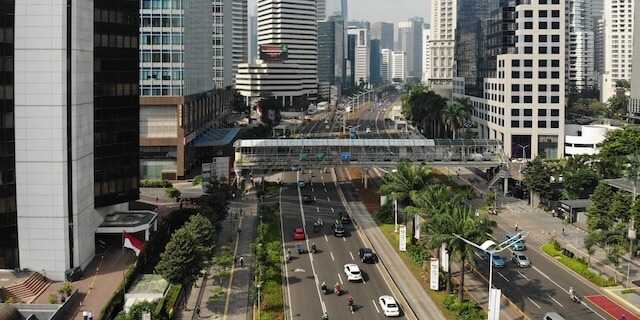Indonesia's key initiatives in waqf financing
Multiple stakeholders across Indonesia are gearing up to boost social Islamic financing in the country, especially for waqf purposes.
The latest initiative comprises organizing awqaf business matching exercises between relevant stakeholders, such as nadzir (waqf manager), mauquf alaih (waqf recipient), entrepreneurs and investors.
Indonesia’s National Sharia Economy and Finance Committee (KNEKS) and Gerakan Wakaf Indonesia assembled more than 32 participants from nadzir, entrepreneur and investor circles around Jakarta, West Java, Central Java and East Java on August 12, KNEKS’s Sharia social finance director, Ahmad Juwaini told Salaam Gateway.
The initiative helped foster seven social Islamic financing agreements, valuing more than 3.3 billion rupiah ($216,520). The participants included Gerakan Wakaf Indonesia, Mojokerto-based cooperative BMT Permata, Sidoarjo-based laundry equipment seller Stupontplus, Arabic language learning app BISA, Sidoarjo-based orphan foundation Yatim Gemilang and The Indonesian Muslim Merchants Association or ISMI.
“We conducted awqaf business matching in Surabaya to facilitate nadzir. For example, those who own land but need to raise money or capital to start a business, or cash waqf nadzir who need a place or buildings to manage their livestock - we led them to investors. Also, fellow nadzir interacted to learn about awqaf management models,” added Juwaini.
Each business matching transaction is capped at 10 billion rupiah ($656,457), as it is simply a prototype to be replicated across other regions. Indonesia has a huge opportunity in awqaf collection across both land and cash waqf, he explained.
Data from the Indonesian Waqf Agency (BWI) showed that the total value of productive waqf in the country currently totals 180 trillion rupiah ($11.8 billion) per year. Meanwhile, based on the overall waqf land valuation, the potential has reached 2,000 trillion rupiah ($131.3 billion) annually.
“Apart from awqaf business matching, Indonesia, through the Haj Fund Management Agency (BPKH), also invested more than $11.5 million in Islamic Development Bank's (IDB) Awqaf Properties Investment Fund, and has already received a dividend of more than $100,000 annually,” Juwaini added.
Societal contributions
Several facets of the society have also been chipping in. Bank Syariah Indonesia (BSI) conducted initiatives in expanding social Islamic finance, especially cash waqf. Through its CSR arm, BSI Maslahat, that is also registered as nadzir at BWI, BSI collected cash waqf from individuals to be invested in productive instruments such as the Cash Waqf Link Sukuk (CWLS). It also distributed its dividends across beneficiaries.
Rizqi Okto Priansyah, director of waqf and digital platform at BSI Maslahat, told Salaam Gateway that the dividend has been deployed for purposes of health, scholarship or/and business capital of the mauquf alaih. More than 192 million rupiah ($12,643) cash waqf has been collected through the program till now.
BSI has also been appointed as a distribution agent for the government's retail CWLS issuance series SWR001 and SWR002. Dividend from the former series has been channeled for the cause of the underprivileged. Meanwhile, business capital for 50 micro, small and medium enterprises (MSMEs) was funded via dividends accumulated from the latter series.
Room for growth
Imam Nur Aziz, Commissioner at the Indonesdian Waqf Agency emphasizes that Indonesia still has to implement a solid model for social Islamic financing, especially waqf. He refers to Thailand’s Pattani project as a viable waqf and commercial concept.
One of the unique traits of the Pattani project is that it combines the concepts of waqf and commerce. The 300-hectare land area has been acquired by a Sharia cooperative and later donated to the Medina Al Salaam Foundation.
A residential property and an educational institute (Fatoni University) have been constructed on the land, alongside facilities for a mosque or Islamic centre, a sports area (stadium), hospital, a convention centre, Asean Mall and others. The development and management of most of these projects are commercially cooperative.
“As a result of this long-term commercial and operational cooperation, most of the profits will be returned to the waqf. And Pattani Asean Mall, which was built on waqf land but operated commercially, will be developed in other ASEAN countries through the Pattani Jaya Commercial institution, one of the subsidiaries of Pattani Jaya Holding (PJH), along with the Madinah Al Salaam Foundation,” Nur Aziz.
The Pattani province, with five of its districts namely Yala, Narathiwat, Songkhla, Patani and Satun, is a Muslim-majority area. Therefore, the urgency of establishing a space that can offer solutions to fulfil basic needs has become a shared obligation. However, the project has a broader goal: To send a message that waqf can perhaps be a key contributor to developing societies.
“Within a limited spectrum, Pattani, with a population of 3.8 million people with various limitations, is able to provide examples of productive waqf. How about Indonesia, which already has BWI with legal standing and set of rules regarding waqf? This is where BWI's challenge is, to create quality waqf entrepreneurs with high social impact,” added Nur Aziz.
